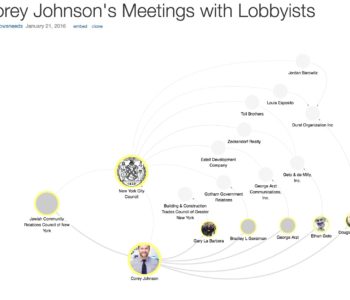 Corey Johnson
Corey Johnson
The unknown history of Corey Johnson’s real estate lobbying
Corey Johnson was an unregistered lobbyist for a real estate company
Before Corey Johnson was elected to the New York City Council, he worked as an unregistered lobbyist for GFI Development Company, according to a 2013 blog post published by the openly gay activist-writer Michael Petrelis. Corey Johnson’s official job title was, Director of Government Affairs and Community Relations. Generally, governmental affairs officials in the private sector act as lobbying contacts with Government Agencies.
Under New York City law, lobbyists are required to register with the Lobbying Bureau of the City Clerk of New York City. During the lead-up to the 2013 Municipal elections, Mr. Petrelis did a search of online lobbying records, and his search turned up no information showing that Corey Johnson was a registered lobbyist for GFI Development Company, according to the 2013 blog post. Because the search failed to show any records that Corey Johnson was a registered lobbyist, Mr. Petrelis filed a complaint with the City Clerk of New York City, according to the 2013 blog post.
A search of Mr. Petrelis’ blog, The Petrelis Files, showed no update to the complaint he filed with the City Clerk of New York City.
An allegation of a conflict of interest
Separately, Seth Barrow, the publisher of the muckraking City Council Watch Web site, raised questions about whether Corey Johnson’s employment with GFI Development Company presented a conflict of interest at the same time when Corey Johnson was chair of Manhattan Community Board 4‘s Land Use Committee, a position that would have allowed Corey Johnson to have access to Government officials, who would have discretion over GFI Development Company’s land use matters, if any.
Encumbered by loyalties to private real estate interests, Corey Johnson embraced a public role involving real estate
Also in the lead-up to the 2013 Municipal elections, it was revealed that Corey Johnson was a director of the Hudson Yards Development Corporation. The Hudson Yards Development Corporation, which oversaw the construction boom in Manhattan’s Far West Side, did not make mandatory any conditions on developers to create new affordable housing. Some of the terms that were applicable to developers were included in the Memorandum of Understanding applicable to Hudson Yards Development Corporation, Government agencies, and real estate developers.
The failure by the Hudson Yards Development Corporation and public officials to make affordable housing a mandatory condition on real estate developers was confirmed in a 2014 report published by The New York Observer, which noted that, “[D]evelopers were offered tax breaks, subsidies and density bonuses in exchange for including affordable units in their projects. But the agreements were optional. Many developers failed to see the upside and didn’t participate.”
As a Councilmember, Corey Johnson has met with lobbyists and real estate trade officials
Mr. Petrelis, the openly gay activist-writer, filed a request under New York State’s Freedom of Information Law, or FOIL, requesting copies of a portion of Corey Johnson’s 2015 calendar. In a report published by Progress Queens, Corey Johnson’s calendar was reviewed for potential conflicts of interest.
Councilmember Johnson’s partial 2015 Calendar shows several meetings with lobbyists. For example, he met with Ethan Geto on August 12 ; with Brad Gerstman of Gotham Government Relations on August 25 ; with George Arzt on September 22 ; … and with Gary LaBarbera, the political operative from the Building and Construction Trades Council of Greater New York, who had been recently leading the failed negotiation efforts to renew the scandal-ridden 421-a tax abatement program that had become the subject of several political and campaign corruption scandals.
In the past, Mr. Geto’s lobbying firm has represented Forest City Ratner, developer of Atlantic Yards in Brooklyn, and Toll Brothers, a developer, which has made at least one contribution to City Hall’s controversial nonprofit lobbying arm, the Campaign for One New York.
As reported by Progress Queens and other media outlets, Mr. Arzt has acted as a lobbyist on behalf of the controversial real estate developer Extell Development Company. Extell pushed to create “poor doors” to be used by affordable housing tenants within its luxury apartment buildings, and Extell has been the target of probes by the now-defunct Moreland Commission and the U.S. Attorney’s Office in connection with controversial property tax breaks the company received for its $2 billion luxury condominium tower in Midtown Manhattan, One57.
Corey Johnson’s approach to land use and housing policies were shaped by his loyalties to private real estate interests.
Who will benefit from Corey Johnson’s approach to land use and housing policies : landlords, or residents of City Council District 3 ?


